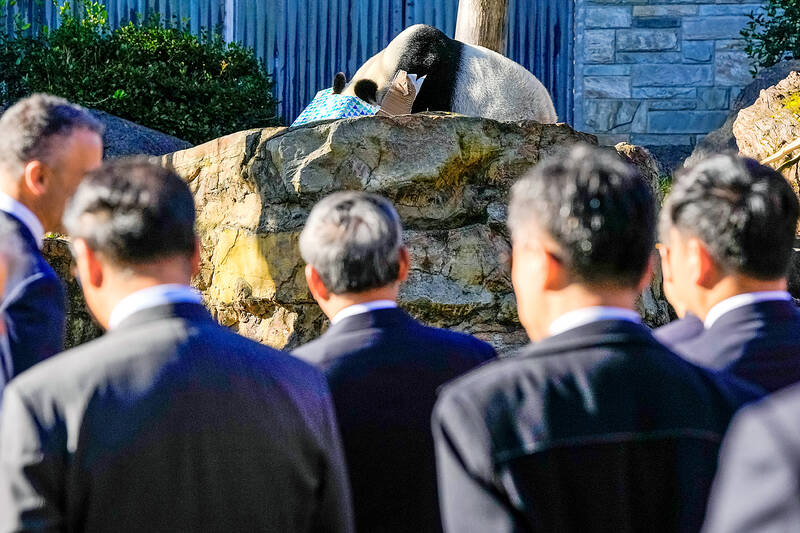Chinese Premier Li Qiang (李強) yesterday promised a new pair of giant pandas to a zoo and urged Australia to set aside its differences with Beijing at the outset of the first visit to the country by China’s second-highest ranking leader in seven years.
The country’s most powerful politician after Chinese President Xi Jinping (習近平) arrived late on Saturday in Adelaide, the capital of South Australia, which has produced most of the wine entering China since crippling tariffs were lifted in March that had effectively ended a A$1.2 billion (US$793.1 million) a year trade since 2020.
Li’s trip has focused so far on the panda diplomacy, rebounding trade including wine and recovering diplomatic links after China initiated a reset of the relationship in 2022 that had all but collapsed during Australia’s previous conservative administration’s nine years in power.

Photo: EPA-EFE
Relations tumbled over legislation that banned covert foreign interference in Australian politics, the exclusion of Chinese-owned telecommunications giant Huawei Technologies Co (華為) from rolling out the national 5G network due to security concerns, and Australia’s call for an independent investigation into the causes of and responses to the COVID-19 pandemic.
Beijing imposed an array of official and unofficial trade blocks in 2020 on a range of Australian exports including coal, wine, beef, barley and wood that cost up to A$20 billion a year.
All the trade bans have been lifted except for Australian live lobster exports, which Australian Minister for Trade and Tourism Don Farrell predicted would also be lifted soon after Li’s visit.
Australian Minister of Foreign Affairs Penny Wong (黃英賢) said Li’s visit was the result of “two years of very deliberate, very patient work by this government to bring about a stabilization of the relationship and to work towards the removal of trade impediments.”
“We will cooperate where we can, we will disagree where we must and we will engage in our national interest,” Wong said before joining Li at Adelaide Zoo, which has been home to China-born giant pandas Wang Wang (網網) and Fu Ni (福妮) since 2009.
Li announced that the zoo would be loaned another two pandas after the pair are due to return to China in November.
“China will soon provide another pair of pandas that are equally beautiful, lively, cute and younger than the Adelaide Zoo, and continue the cooperation on giant pandas between China and Australia,” Li said, adding that zoo staff would be invited to “pick a pair.”
Wong thanked Li for ensuring that pandas would remain the zoo’s star attraction.
“It’s good for the economy, it’s good for South Australian jobs, it’s good for tourism, and it is a signal of goodwill, and we thank you,” she said.

CHAOS: Iranians took to the streets playing celebratory music after reports of Khamenei’s death on Saturday, while mourners also gathered in Tehran yesterday Iranian Supreme Leader Ayatollah Ali Khamenei was killed in a major attack on Iran launched by Israel and the US, throwing the future of the Islamic republic into doubt and raising the risk of regional instability. Iranian state television and the state-run IRNA news agency announced the 86-year-old’s death early yesterday. US President Donald Trump said it gave Iranians their “greatest chance” to “take back” their country. The announcements came after a joint US and Israeli aerial bombardment that targeted Iranian military and governmental sites. Trump said the “heavy and pinpoint bombing” would continue through the week or as long

TRUST: The KMT said it respected the US’ timing and considerations, and hoped it would continue to honor its commitments to helping Taiwan bolster its defenses and deterrence US President Donald Trump is delaying a multibillion-dollar arms sale to Taiwan to ensure his visit to Beijing is successful, a New York Times report said. The weapons sales package has stalled in the US Department of State, the report said, citing US officials it did not identify. The White House has told agencies not to push forward ahead of Trump’s meeting with Chinese President Xi Jinping (習近平), it said. The two last month held a phone call to discuss trade and geopolitical flashpoints ahead of the summit. Xi raised the Taiwan issue and urged the US to handle arms sales to

A magnitude 5.6 earthquake struck off the coast of Yilan County at 12:37pm today, with clear shaking felt across much of northern Taiwan. There were no immediate reports of damage. The epicenter of the quake was 16.9km east-southeast of Yilan County Hall offshore at a depth of 66.8km, Central Weather Administration (CWA) data showed. The maximum intensity registered at a 4 in Yilan County’s Nanao Township (南澳) on Taiwan’s seven-tier scale. Other parts of Yilan, as well as certain areas of Hualien County, Taipei, New Taipei City, Taoyuan, Hsinchu County, Taichung and Miaoli County, recorded intensities of 3. Residents of Yilan County and Taipei received

Taiwan has secured another breakthrough in fruit exports, with jujubes, dragon fruit and lychees approved for shipment to the EU, the Ministry of Agriculture said yesterday. The Animal and Plant Health Inspection Agency on Thursday received formal notification of the approval from the EU, the ministry said, adding that the decision was expected to expand Taiwanese fruit producers’ access to high-end European markets. Taiwan exported 126 tonnes of lychees last year, valued at US$1.48 million, with Japan accounting for 102 tonnes. Other export destinations included New Zealand, Hong Kong, the US and Australia, ministry data showed. Jujube exports totaled 103 tonnes, valued at